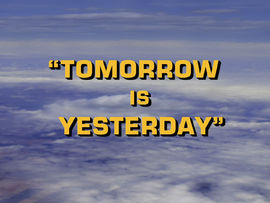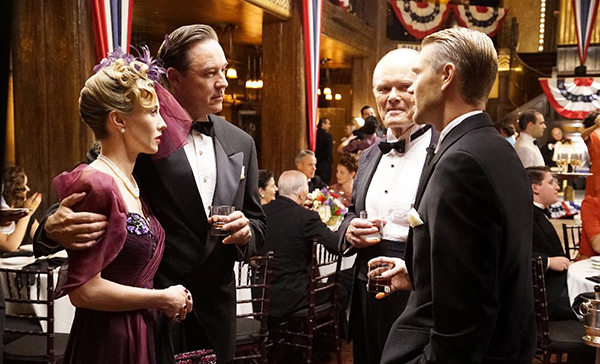Star Trek celebrated its fiftieth anniversary this month. So, here on Redeeming Culture, we’re going to release a short review of every episode of Season One, one episode per day, all month long; for each episode, we’re writing a 3-sentence recap, a 3-word review, and (as much as we can) answering the questions “What fears or hopes are conquered or realized?” and “How does this point to Jesus or to the way God made us?”
For more about Trektember, read our preview post. Please note that there are minor plot spoilers for this episode below.
Today’s episode is number 20: Tomorrow Is Yesterday.

Three-sentence Recap
The Enterprise gets thrown back in time to the late 1960s, and are inadvertently spotted by Captain John Christopher, a curious “modern-day” pilot. They beam him aboard to save his life, but he can’t go back and report what he saw without changing the timeline. Unfortunately, Spock discovers, they have to send him back; otherwise, his son will never be born, and space exploration will never be the same again.
Three-word Review
Love time travel.
Big Sci-Fi Concepts
- Time travel is the obvious big concept here. The question of “contaminating the timeline” is explored, and ultimately averted without consequence.
- While not exclusive to sci-fi, the “For Want of a Nail” plotline is well-explored in sci-fi. While another time travel episode later this season explores it better, this episode uniquely looks at the idea of a single historical person being the hinge upon which history turns.
Fears Conquered/Hopes Realized
- The fear that everything is wrong, or is going to turn out wrong, grips the Enterprise crew.
- The fear of not making a significant impact on the world affects Christopher; first because Spock said he made “no significant contribution,” and second because the crew wouldn’t let him return to Earth to do so through his son.
What does this episode tell us about God or about man?
While we don’t know much about Captain Christopher before flies up to intercept the UFO which turns out to be the Enterprise, we do know that he’s a family man. He cares a lot about his family, and that usually speaks to a desire for a strong legacy.
A lot of times, when we think about legacy, we think about some sort of large monument built to an important person, or a building gifted in someone’s memory. But if a legacy is anything we do that transcends us, goes beyond us, then we don’t have to be rich or famous or important to have a legacy.
So what will your legacy be?
Christopher got a look at his legacy. He heard Spock say that he would have a son; but more than that, he heard that his son made a difference. He heard that the difference he made was fundamental to the future. That it moved humanity toward the gleaming promise of incredible exploration, diversity, and cooperation that the Enterprise represented. And it made him want even more to go back to Earth and make a difference.
Two men in the Bible saw a similar thing: Ezekiel, in the book bearing his name, and John, in the book of Revelation. In both cases, they were shown a vision of heaven and the beauty and majesty of God. But also in both cases, they were given a job to do back on Earth: to proclaim God’s glory to the world. The message was similar to Captain Christopher’s: the charge you are given will point people toward all of this.
We all want to work for something bigger. And when you have a glimpse of that Greater Purpose, your calling becomes clear.
• • •
Thank you for reading Redeeming Culture! Come back tomorrow for more Trektember as we look at episode 21 of Star Trek: “The Return of the Archons”.

